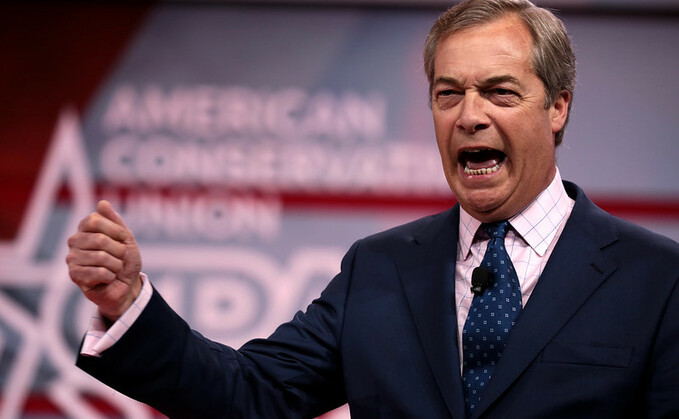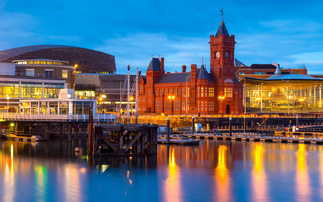
Nigel Farage / Credit: Gage Skidmore
Climate denialists populists have been emboldened by summer headlines dominated by division and drift, but it is possible for political and business leaders to tell a story of progress - if only they are willing to try
It has been a long, hot, and disorientating summer for the green economy, both in the UK and globally.
The now familiar tension between the record-breaking roll out of clean technologies and ever-intensifying climate impacts has been present and correct. But the disconnect between advancing efforts to build a net zero and climate resilient economy and a political and media discourse that has been despairing to the point of nihilistic has rarely felt more pronounced.
Green business leaders and environmental campaigners have had to become adept over the years at navigating the cognitive dissonance triggered by conflicting news of deadly heatwaves and surging solar generation or collapsing harvests and advancing regenerative farming practices. But there are times this summer when the inherent optimism required to advance the net zero transition has felt under siege like never before.
This is partly a function of the way the forces of progressive liberalism (which thanks to the collapse of so much the right of politics in the UK and elsewhere into reckless populism and full blown climate denialism can feel like the last redoubt of environmentalism) have become a punch bag for authoritarians and petrostate apologists everywhere. The politicians and commentators that are the primary political advocates for climate action have been forced to simultaneously fight a rear guard action against resurgent nativism, outright xenophobia, and even borderline fascism. Too often they have appeared at a loss as to how to respond to bad faith actors they naively thought had been vanquished. The bandwidth required to simultaneously make the case for a global clean energy transition and an era of nature recovery has been eaten up.
Consequently, morale among those pushing for a more sustainable and secure economic model has been visibly eroded. The horrors of Gaza, Russia's grinding advances in Ukraine, Trump's continued torching of democratic norms and moral decency, and the relentless intensification of climate impacts have left progressives and environmentalists everywhere feeling despondent and powerless.
In the UK, this sense of impotence has been exacerbated by a Labour government that has too often failed to deliver on its promise of radical change. The government that has spent the summer months in a defensive crouch, allowing the hard right, and even at times the far right, to set the agenda. Number 10 has repeatedly failed to condemn some of the most shameless rabble-rousing in years from its political opponents. Moral cowardice is catching. Meanwhile, the degradation of so much of the right of British politics at the hands of Elon Musk's online radicalisation engine has continued apace. The traditional summer silly season has become the sinister season, as certain politicians and media outlets who should know better have surfed the line between predicting political violence and relishing the prospect of it.
Right wing parties that only a year ago lost a landslide election that should have discredited their economic mismanagement and Brexit project for a generation have continued to dominate the discourse. And their agenda-setting has had a direct impact on the UK's green economy. Reform UK is currently leading the polls and has talked openly of tearing up clean energy contracts and reviving fracking. A Nigel Farage-led government would almost certainly follow Trump in quitting the Paris Agreement, demolishing the UK's position as a genuine leader in booming global clean technology markets. The Conservatives - the same Party that gave the UK its net zero target - are now in a bidding war with Reform UK to see who can come up with the most climate reckless policy proposal. Investors and businesses will now adjust the political risk calculations and the price of capital for their new clean tech projects accordingly.
More broadly, the ESG backlash has continued to gain momentum on both sides of the Atlantic, as evidenced by the on-going retrenchment of net zero finance groups, while a growing number of leading corporates have been forced to admit their original net zero targets were too ambitious and now need delaying. Meanwhile, the failure of the Global Plastics Treaty talks to overcome petrostate wrecking tactics dealt yet another blow to hopes of a multilateral response to shared environmental crises.
Against this bleak backdrop, the COP process has chosen precisely the worst year to orchestrate a logistical nightmare in the Amazon, which promises to undermine a summit that is already struggling to secure the requisite engagement from the world's most powerful governments.
And yet, this understandable sense of frustration and despondency makes it even more important that green businesses draw again from the well of optimism that has fuelled the innovations, projects, and investments that are critical to the success of the global clean tech boom.
It may not have got much of an airing, but there was a counternarrative available this summer. One built on all those renewables records, soaring EV sales, and the huge and growing pipeline of clean energy projects both in the UK and overseas. China's emissions appear to be falling and the EU's net zero plans continue to advance. No one has followed Trump in quitting the Paris Agreement and the path to delivering on its goals is clearer than ever. Clean technologies have got more competitive, awareness of the need for climate resilience has become the sweltering norm, and carbon pricing regimes and decarbonisation policy frameworks have become more extensive and effective. There are still people - brave, admirable people - making the case for humane and progressive solutions to the increasing levels of migration that an era of escalating climate crises will make inevitable.
Closer to home, the Labour government has quietly advanced a series of infrastructure investments and planning reforms that are enabling a wave of transformational clean energy and low carbon infrastructure projects. With a handful of honourable exceptions Ministers have proven terrible at telling this story, but the UK really could be at the forefront of a new era of clean energy abundance, establishing itself as a trail-blazer in a global, epoch-defining industrial revolution for the second time in 200 years.
A co-ordinated, energetic, and sustained fight back against resurgent climate denialism, shameless xenophobia, and creeping authoritarianism is urgently required. It would be great if the government and media opinion-formers could find a way to lead this response, to promote the progress that is being made and weave it into a national story that challenges the narrow, reductive, and cruel vision offered by the likes of Nigel Farage and Robert Jenrick. But if they are unwilling or unable to do so then it is up to those who are proactively working to build a better, sustainable, and more prosperous economy for all to articulate what they are doing and why they are doing it. A strange summer is coming to an end. It is time to get back to work.
A version of this article first appeared as part of BusinessGreen's Overnight Briefing email, which is available to all BusinessGreen Intelligence members.









